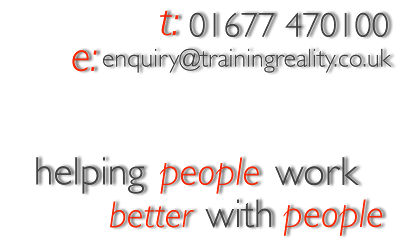Please press (at least!) one of these.
It costs you nothing, and (possibly) helps us spread the word!
NLP and a step too far
Friday, 21 August 2009
One of the most powerful aspects, for me, of NLP is the underlying principle that we, as individuals, are responsible for our reactions to the behaviour of others. This is a fabulous starting point, as it combines giving us the right and acknowledges the ability to control our own responses with the knowledge and understanding that others cannot control us. Wonderful - we’re in charge of ourselves!
If only it were truly as easy as that! Some trainers (I hasten to add, not the people who trained me, who were wonderful) use this, and other NLP techniques and tools, as simple quick fixes, but I genuinely don’t think life is like that. At times, it can be much harder, much more complex, and that’s where reverting to the basic principles, rather than the specific tools, is really helpful.
As an example, one of the phrases I hear “misused” too often (once would be too often in my book!) is “I’m sorry you’ve taken it that way”, or variations on the theme. I think it is possible to use this type of phrase in a respectful and useful way, but I hear it more often in a way that is more closely linked to either gaining power over someone else, or abdicating responsibility for your actions.
The underlying problem is one of balance. If I wander around saying and doing whatever I like to anyone else, with the smug and self-satisfied smile of someone who will simply turn around and say “it’s your choice”, “you’re letting me hurt you”, “you’re choosing to take it that way”, I might be right at some level, but I’m not showing any respect, any responsibility, or indeed any decency.
In these circumstances, the balance is out-of-kilter. The two weights on the scales in the “evil-NLP’er” mode are:
1) You are responsible for your reaction to me.
2) I don’t take responsibility for your reaction to me.
In this case, the weights are effectively on the same side, but they are on the side of the other person. Despite the fact that you showing no responsibility, you are expecting the other person to take all the responsibility.
You don’t need to change many words to translate this to a much more principled, appropriate, and decent balance of weight on the set of scales:
1) I do take responsibility for your reaction to me.
2) You are not responsible for my reaction to you.
In this case, the weights are again on one side only, but they are on your side, not the other persons. After all they are your weights in the first place - you can’t simply foist them on others.
The significant difference between these two is that the first set, whilst being in line with NLP is some respects, completely misses the point that we all need to start by taking ownership for ourselves - it’s about us and what’s inside, not about imposing that on other people. The second set shows complete ownership, and therefore is much more in line with a prinicple-led approach to NLP.
I’d love to get further examples of how fundamentally good models and training material can be so easily warped, misunderstood, and misused - shine a bright light into the darker recesses!
Please press (at least!) one of these.
It costs you nothing, and (possibly) helps us spread the word!





